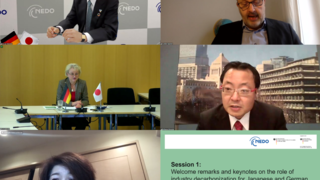11th German-Japanese Environment & Energy Dialogue Forum
The 11th German-Japanese Environment and Energy Dialogue Forum took place from February 16-18, 2021. Experts from politics, business and science discussed political, technical and social paths to a greenhouse gas neutral industry.

Both Japan and Germany are aiming for greenhouse gas neutrality by 2050. This will require a profound transformation that affects all parts of economy and society. Industry, which is responsible for around 30% of greenhouse gas emissions worldwide, has a key role to play.
From February 16th to 18th 2021, more than 450 experts from politics, business and science from both countries came together at this year's digital German-Japanese Environment and Energy Dialogue Forum (EEDF) to reflect on the industry of tomorrow and discuss political, technical and social paths towards a greenhouse gas-neutral industry. The central questions were: How can greenhouse gas neutrality be achieved in Japanese and German industry? What are the main challenges, possible solutions and technological options? How can policy support change and enable industry to become pioneers in the carbon-free technology markets of the future?
Since its foundation in 2007, the EEDF has become a renowned platform for the exchange of information between experts from industry, science and politics from both countries on current environmental and energy issues as well as a starting point for cooperation projects. The event is organized by the German Federal Ministry for the Environment (BMU), the German Federal Ministry for Economic Affairs and Energy (BMWi) and Japan’s NEDO (New Energy and Industrial Technology Development Organization). The event is also supported by the Japanese Ministry of Economy, Trade and Industry (METI) and the Japanese Ministry of the Environment (MoEJ). The forum was implemented by adelphi and ECOS, the organization was also supported by the German Chamber of Commerce and Industry in Japan. On behalf of the BMWi, adelphi has been supporting the bilateral energy dialogue between Germany and Japan since 2016, which was further intensified and consolidated in 2019 with the establishment of the Energy Partnership.
Day 1: Pathways to a climate-neutral industry and their significance for Japanese and German energy and climate policy.
The three-day conference began with keynotes by high-ranking representatives from Japan and Germany. Mr. Ishizuka, Chairman of Japan's New Energy and Industrial Technology Development Organization (NEDO), emphasized the importance of Japan's announcement to achieve carbon neutrality by 2050 in his welcome address. He also spoke of the fact that Germany and Japan have high innovation potential, which entails a responsibility to provide the world with access to new technologies.
Norbert Gorißen, Deputy Director General of International Affairs at the German Federal Ministry for the Environment, added in his keynote that climate change requires responses in all sectors and that industry in particular is a key sector on the road to decarbonization. He also explained the steps Germany is taking to decarbonize industry, mentioning, for example, a flagship program to support industries and protection against carbon leakage.
Ursula Borak, Deputy Director General for International Energy Cooperation at the German Federal Ministry for Economic Affairs and Energy, emphasized the long-standing friendship between Japan and Germany in her speech, as well as the successful cooperation between the two countries. In view of the common goal of climate neutrality, cooperation formats such as the energy partnership are valuable, she said.
Shinichi Kihara, Deputy Commissioner for International Affairs at the Agency for Natural Resources and Energy in the Japanese Ministry of Economy, Trade and Industry (METI), mentioned his country's Green Growth Strategy in his speech and emphasized that a positive cycle between economic growth and environmental protection could be created in the future. He also stated that hydrogen, carbon recycling and offshore wind power are key steps on the way to decarbonizing Japan's economy.
The opening session was concluded by Keiko Segawa, Deputy Director-General, Global Environment Affairs, at the Japanese Ministry of the Environment. She said that Japan was determined to move towards climate neutrality and explained that medium- and long-term strategies were currently being drawn up. In particular, Japan wants to set more ambitious targets for 2030 before COP 26. In addition, she mentioned that Japan's Covid-19 funding package would also be used for green technologies, that Japan would link the export of coal-fired power plants to long-term plans for climate neutrality, and that the introduction of a CO2 price would be further discussed.
The introductory speeches were followed by Session 1, which focused on the fundamentals and scenarios for decarbonizing the industry. Prof. Arima from the University of Tokyo and Dr. Matthes, research coordinator for energy and climate policy at the Öko-Institut, took a closer look at the challenges to be overcome and the framework conditions required from the perspective of their respective countries. In her presentation, Yuko Nishida from the Renewable Energy Institute presented current studies on Japan's strategies, focusing in particular on the role of hydrogen as a key technology. Philipp Hauser, project manager at Agora Energiewende, highlighted the special importance of the steel, chemical and cement industries in decarbonization and illuminated corresponding policy options.
The first day of the conference was concluded by networking sessions, which gave participants and speakers an opportunity for further and more in-depth exchange on the topics of the day. Of particular interest was the session on carbon markets with Mr. Kardish from the Secretariat of the International Carbon Action Partnership. But the participants also actively contributed in other sessions, which dealt with structural change in an exchange with representatives of affected regions and with Japanese food culture in Berlin.
Day 2: Technical challenges, industry strategies and digital solutions
On the second day of the conference, the focus shifted more towards technical issues, starting with decarbonization strategies of the industry. The first speaker was Dr. Wenzel, Head of the Competence Center Climate Protection in Energy-Intensive Industries, who outlined how the German government plans to support decarbonization projects in industry. The second speaker, Ms. Siepmann, Senior Expert for Sustainability at Bosch, presented her company's approach to achieving CO2 neutrality at its own sites by 2020. Mr. Monden, Department Manager at Hitachi, added his company's Japanese perspective to this German view. In particular, he addressed efforts towards smart technology applications.
In the following session, special attention was paid to the role of digitalization. Dr. Tuppen, founder of Advancing Sustainability Ltd, outlined how digital solutions, such as smart and micro grids, can be central to decarbonization, especially in emerging economies. Dr. Yabe of NEDO provided a focus on the role of digitalization in achieving targets in Japan. He explained that digitalization is of great importance in all three pillars of CO2 reduction; renewable energy, circular economy and bioeconomy, and particularly emphasized the need for further technological developments.
The two presentations were followed by demonstration projects from the industry, such as the "Smart Energy Stores" concept of the Lawson supermarket chain in Japan, the Future Energy Lab of the German Energy Agency, and decarbonization efforts undertaken by the Japanese power company Tepco.
The day was again finalized by networking sessions, which included exchanges on individual companies' responsibilities to decarbonize, digitalization, and the effects of the Covid-19 pandemic on economies and emissions.
Day 3: Energy efficiency and hydrogen as options for decarbonization
The third day also had a strong focus on technical issues. The first session addressed energy efficiency as a decarbonization option. Dr. Riedel, head of the Institute for Low-Carbon Industrial Processes at the German Aerospace Center, explained his institute's research on high-temperature heat pumps that can be used to electrify industrial processes in the temperature range of 150 -550° C. Other demonstration projects were then presented, such as a concept for the efficient use of waste heat at trailer manufacturer Krone and a concept for the mathematical optimization of production processes at Toyo Engineering Corporation. In addition, Dr. Döhl from Aluminium Norf and Mr. Takeuchi from JX Nippon Metal and Mining each presented concepts for decarbonization through efficiency improvements and recycling in metal production.
The final session of the conference focused on the role of hydrogen in decarbonizing industry. In the session's first presentation, Dr. Herbst outlined the current and prospective technologies as well as potential uses for industry. She emphasized that emission reductions of up to 95% would be possible in industry, but that this would require basic prerequisites such as a rapid market maturity of climate-neutral production processes, a sufficient supply of hydrogen, or an increased circular economy. Suitable demonstration projects were then presented, which showed that many of the necessary technologies already exist or are currently being implemented. For example, Mr. Sakamoto of Yamanashi Prefecture presented power-to-gas approaches, Ms. Willnauer of RWE explained the H2 Nucleus project and the implementation of the first hydrogen grid in Germany, and Mr. Yuzuki explained Marubeni Corporation's strategy to establish a CO2-free energy balancing system. Lastly, Dr. Juchmann from Salzgitter and Dr. Nomura from Nippon Steel Corporation addressed approaches to decarbonizing steel production. In both presentations, it became clear that steel production with hydrogen is technically feasible, but that projects in this regard are still dependent on government support.
The last day of the conference again ended with networking sessions. On Thursday, participants and speakers were able to discuss the potential of energy efficiency, the question which processes should be decarbonized first, and new forms of work after the pandemic.
Overall, the eleventh German-Japanese Environment and Energy Dialogue Forum was a success. More than 450 experts from Germany and Japan participated in the virtual conference and especially the lively participation in question and answer rounds as well as in the networking sessions showed the great interest in the discussed topics. At the end of the conference, organizers and moderators of the conference, Mr. Hirai from NEDO, Mr. Will from adelphi and Ms. Schilling from ECOS, emphasized their anticipation of the twelfth forum, as well as their hope that it can take place in person in Tokyo.
(This text is originally from https://gj-eedf.org/ja/report-english)

